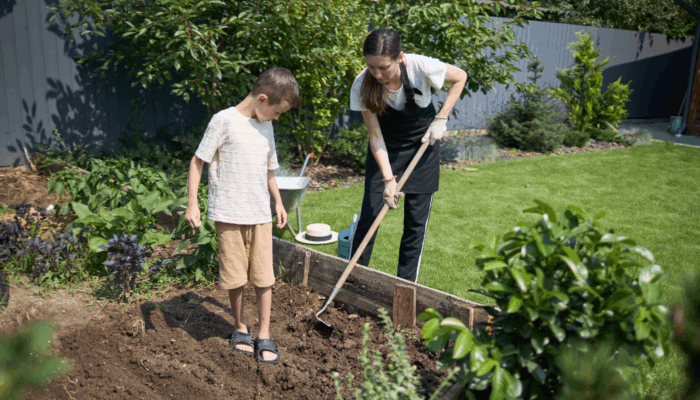In our modern, screen-obsessed world, we’re facing a new kind of parenting challenge. We’re raising a generation of kids who are masters of the digital world but are increasingly disconnected from the physical one. They are experts at swiping but have never felt the simple, tactile satisfaction of raking a real pile of leaves.
As parents and leaders, we’re always looking for ways to build character, to teach responsibility, and to pull our kids away from the blue-light glow of a tablet. The answer, it turns out, is not a new app. It’s right outside your back door.
Yard work is not punishment. It is one of the most powerful, hands-on, and effective “classrooms” a child can ever experience. It’s a way to teach them how the real, physical world works. As kids get older, the chores scale. It moves from simple weeding to helping you with the big, satisfying projects, like spreading a new load of mulch that was just delivered. That big dump truck, and the heavy-duty tarp system it uses to keep its load secure, is a real-world lesson in itself. It’s a peek into the world of physics, industry, and the real work that makes our world function.
If you’ve been letting the kids slide on outdoor chores, you’re missing a massive opportunity. Here are five powerful, character-building benefits of getting your kids to help in the yard.
1. It Teaches Real, Tangible Consequences
This is the most important lesson of all. In a digital world, nothing is permanent. You fail a level in a video game, you hit reset. You make a mistake on a school assignment, and you hit undo. The yard is different. The yard has real stakes. If you forget to water the new flowers for a week, they die. If you do a lazy job pulling weeds, the weeds will be twice as bad next week.
A yard is a living, breathing system. It does not have a reset button. This teaches a child one of the most fundamental lessons of adulthood: actions (and inactions) have real, tangible, and often irreversible consequences. It’s a powerful lesson in responsibility that a screen can never, ever teach.
2. It’s a Hidden STEM Lab
We spend a fortune on STEM toys, coding camps, and science kits. But your backyard is the original and best STEM lab.
- Biology: It’s a hands-on lesson in how life works. Why do plants need sun? What’s the difference between a weed and a flower? Why are worms so important for the soil?
- Physics: Yard work is a physics lesson in action. You are teaching them about tools and leverage. A child learns that a wheelbarrow (a lever on a fulcrum) allows them to move a 100-pound load that they could never lift on their own. They learn that a rake is a tool to multiply force.
- Chemistry: This is where composting comes in. The process of turning household waste (leaves, grass clippings, and eggshells) into rich, black, usable soil is a 6-month science experiment in decomposition.
3. It Builds True Grit
We live in a world of instant gratification. Instant downloads, instant food delivery, instant answers. Yard work is the perfect antidote. Yard work is, by its nature, hard. It’s hot. It’s sweaty. It’s dirty. And it’s slow.
You can’t speed-run raking an entire yard. You can’t hack pulling weeds from a long garden bed. It’s a job that requires you to put your head down, put in the work, and just grind. This is the definition of grit. It teaches a child the immense, delayed satisfaction of looking at a hard, finished job and saying, “I did that.” That sense of pride and resilience is a skill that will serve them for their entire lives.
4. It Fosters a Sense of Team and Contribution
“Clean your room” is a solo chore. It benefits one person. “Help me with the yard” is a team chore. It benefits the whole family. This is a critical psychological shift.
- It Fosters Stewardship: When a child is involved in maintaining the family space, they develop a sense of ownership and pride. It’s not just “Mom’s garden”; it’s “our garden.”
- It Teaches Contribution: It shows them that a family is a team, and that the team only works when everyone contributes to the greater good. They are not just a consumer in the household; they are a valuable, necessary producer. This is a massive boost to their self-esteem.
5. It’s a Forced Digital Detox
This is a benefit for the whole family. You cannot rake leaves, push a mower, or pull weeds while you are scrolling on a smartphone.
- It’s an Analog Task: It forces you and your kids to put the devices down and interact with the real, physical world.
- It’s a Mental Reset: This is a mindful activity. The repetitive, rhythmic nature of tasks like raking or weeding can be incredibly meditative. It’s a proven way to reduce stress and anxiety.
- It’s a Point of Connection: When you are working side-by-side with your child, with no screens to distract either of you, you will have the best conversations. It’s a natural, no-pressure environment to just talk.
Stop thinking of yard work as a chore you have to get done. Start thinking of it as one of the most valuable, hands-on, character-building activities you can do with your kids. It’s a classroom for responsibility, a gym for building grit, and a sanctuary for building a real, unplugged connection.
